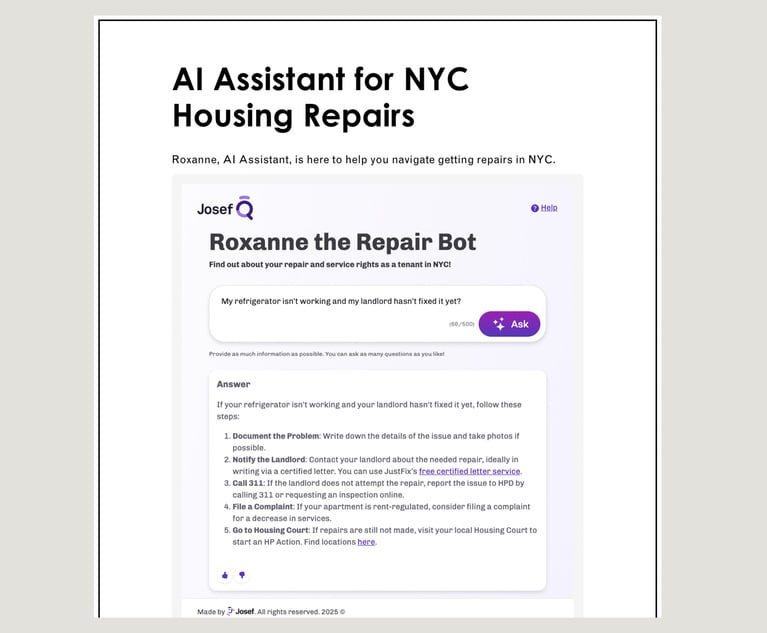 Frances Green, left, and Rebecca Porter, right, of Epstein Becker Green. Courtesy photos
Frances Green, left, and Rebecca Porter, right, of Epstein Becker Green. Courtesy photos The Legal Vision for the Future or an AI Hallucination? Navigating the Complexities of Attorney Ethics and Use of Artificial Intelligence
The evolution of AI programs presents an interesting dichotomy: If they are proven successful by increasing efficiency and enhancing effectiveness, should there also be a threshold mandate for their use in the legal profession, and if so, what ethical mandates should sit alongside such requirements?
April 02, 2024 at 10:00 AM
9 minute read
The evolution of artificial intelligence programs presents an interesting dichotomy: If they are proven successful by increasing efficiency and enhancing effectiveness, should there also be a threshold mandate for their use in the legal profession, and if so, what ethical mandates should sit alongside such requirements?
Artificial intelligence (AI) enables machines to mimic human intelligence to perform tasks such as learning, decision making and problem solving and through the integration and use of AI in various industrial and financial sectors, transformative changes continue. The legal community has confronted the challenges of adapting to the use of AI with optimism and justifiably so. AI has been used to automate document analyses, enhance legal research, predict legal outcomes, and facilitate case management, resulting in increased efficiency and accuracy in the legal practice. Legal databases such as Lexis+ and Westlaw boast of new AI programs to transform legal research, contract analyses and document review while promoting "hallucination-free" legal support.
This content has been archived. It is available through our partners, LexisNexis® and Bloomberg Law.
To view this content, please continue to their sites.
Not a Lexis Subscriber?
Subscribe Now
Not a Bloomberg Law Subscriber?
Subscribe Now
NOT FOR REPRINT
© 2025 ALM Global, LLC, All Rights Reserved. Request academic re-use from www.copyright.com. All other uses, submit a request to [email protected]. For more information visit Asset & Logo Licensing.
You Might Like
View All
Courts Beginning to Set Standards for Evidence Relying Upon Artificial Intelligence
4 minute read
Josef Partners With NYU, Housing Court Answers to Launch AI Assistant Built for Tenants

Class Certification, Cash-Sweep Cases Among Securities Litigation Trends to Watch in 2025
6 minute readLaw Firms Mentioned
Trending Stories
- 1Report: US Attorney E. Martin Estrada to Resign From California's Central District
- 2Steve Bannon Ordered Into Court for Questioning Over New Counsel
- 3Newly-Elected Albany County DA Restructures Office Leadership
- 4Public Defenders and Allies Oppose Rollback of NY Discovery Statute
- 5The Gospel According to Paxton? AG Fights Religious Group Over Migrants
Who Got The Work
Michael G. Bongiorno, Andrew Scott Dulberg and Elizabeth E. Driscoll from Wilmer Cutler Pickering Hale and Dorr have stepped in to represent Symbotic Inc., an A.I.-enabled technology platform that focuses on increasing supply chain efficiency, and other defendants in a pending shareholder derivative lawsuit. The case, filed Oct. 2 in Massachusetts District Court by the Brown Law Firm on behalf of Stephen Austen, accuses certain officers and directors of misleading investors in regard to Symbotic's potential for margin growth by failing to disclose that the company was not equipped to timely deploy its systems or manage expenses through project delays. The case, assigned to U.S. District Judge Nathaniel M. Gorton, is 1:24-cv-12522, Austen v. Cohen et al.
Who Got The Work
Edmund Polubinski and Marie Killmond of Davis Polk & Wardwell have entered appearances for data platform software development company MongoDB and other defendants in a pending shareholder derivative lawsuit. The action, filed Oct. 7 in New York Southern District Court by the Brown Law Firm, accuses the company's directors and/or officers of falsely expressing confidence in the company’s restructuring of its sales incentive plan and downplaying the severity of decreases in its upfront commitments. The case is 1:24-cv-07594, Roy v. Ittycheria et al.
Who Got The Work
Amy O. Bruchs and Kurt F. Ellison of Michael Best & Friedrich have entered appearances for Epic Systems Corp. in a pending employment discrimination lawsuit. The suit was filed Sept. 7 in Wisconsin Western District Court by Levine Eisberner LLC and Siri & Glimstad on behalf of a project manager who claims that he was wrongfully terminated after applying for a religious exemption to the defendant's COVID-19 vaccine mandate. The case, assigned to U.S. Magistrate Judge Anita Marie Boor, is 3:24-cv-00630, Secker, Nathan v. Epic Systems Corporation.
Who Got The Work
David X. Sullivan, Thomas J. Finn and Gregory A. Hall from McCarter & English have entered appearances for Sunrun Installation Services in a pending civil rights lawsuit. The complaint was filed Sept. 4 in Connecticut District Court by attorney Robert M. Berke on behalf of former employee George Edward Steins, who was arrested and charged with employing an unregistered home improvement salesperson. The complaint alleges that had Sunrun informed the Connecticut Department of Consumer Protection that the plaintiff's employment had ended in 2017 and that he no longer held Sunrun's home improvement contractor license, he would not have been hit with charges, which were dismissed in May 2024. The case, assigned to U.S. District Judge Jeffrey A. Meyer, is 3:24-cv-01423, Steins v. Sunrun, Inc. et al.
Who Got The Work
Greenberg Traurig shareholder Joshua L. Raskin has entered an appearance for boohoo.com UK Ltd. in a pending patent infringement lawsuit. The suit, filed Sept. 3 in Texas Eastern District Court by Rozier Hardt McDonough on behalf of Alto Dynamics, asserts five patents related to an online shopping platform. The case, assigned to U.S. District Judge Rodney Gilstrap, is 2:24-cv-00719, Alto Dynamics, LLC v. boohoo.com UK Limited.
Featured Firms
Law Offices of Gary Martin Hays & Associates, P.C.
(470) 294-1674
Law Offices of Mark E. Salomone
(857) 444-6468
Smith & Hassler
(713) 739-1250







